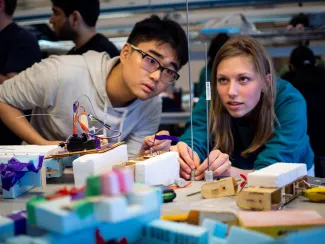"The courses are hard! But if you can push through it, you are likely to find it’s something you love."

Kalob White
- Degree:
- Bachelor of Applied Science
- Program:
- Campus: Okanagan
How did you get interested in engineering?
Growing up, I loved playing with Lego and making things, and I’ve always been into math and science. I realized engineering could be a way for me to pursue these interests and contribute my skills in ways that could make the world a better place.
What is your co-op position?
I am a member of the Blatchford Renewable Energy team, which is part of Infrastructure Services at the City of Edmonton. Blatchford Renewable Energy is the utility that delivers renewable heating and cooling to homes in Blatchford, which is a new sustainable community being built at the location of the former municipal airport.
Blatchford Renewable Energy Blatchford
What skills have you learned in co-op?
I’ve gained new technical and soft skills and had lots of practice applying the problem-solving skills and theories we learned in school to real life.
Communication and project management skills are very important. We’re a small team, but we connect with a much broader group of City employees and consultants. Being able to communicate well is essential for coordinating projects and teams and solving real-world problems.
What’s next for the rest of your time at UBC?
Starting in the fall of 2025 I will be taking third-year mechanical engineering courses. I’m excited about an upcoming project management course so I can see how it lines up with what I’ve experienced at the City of Edmonton.
I’m also looking forward to a manufacturing course where we’ll get to work with the CNC machines to bring our designs to life.
I’m specializing in aerospace, so many of my fourth-year courses will enable me to concentrate in this area that I’m very passionate about!




